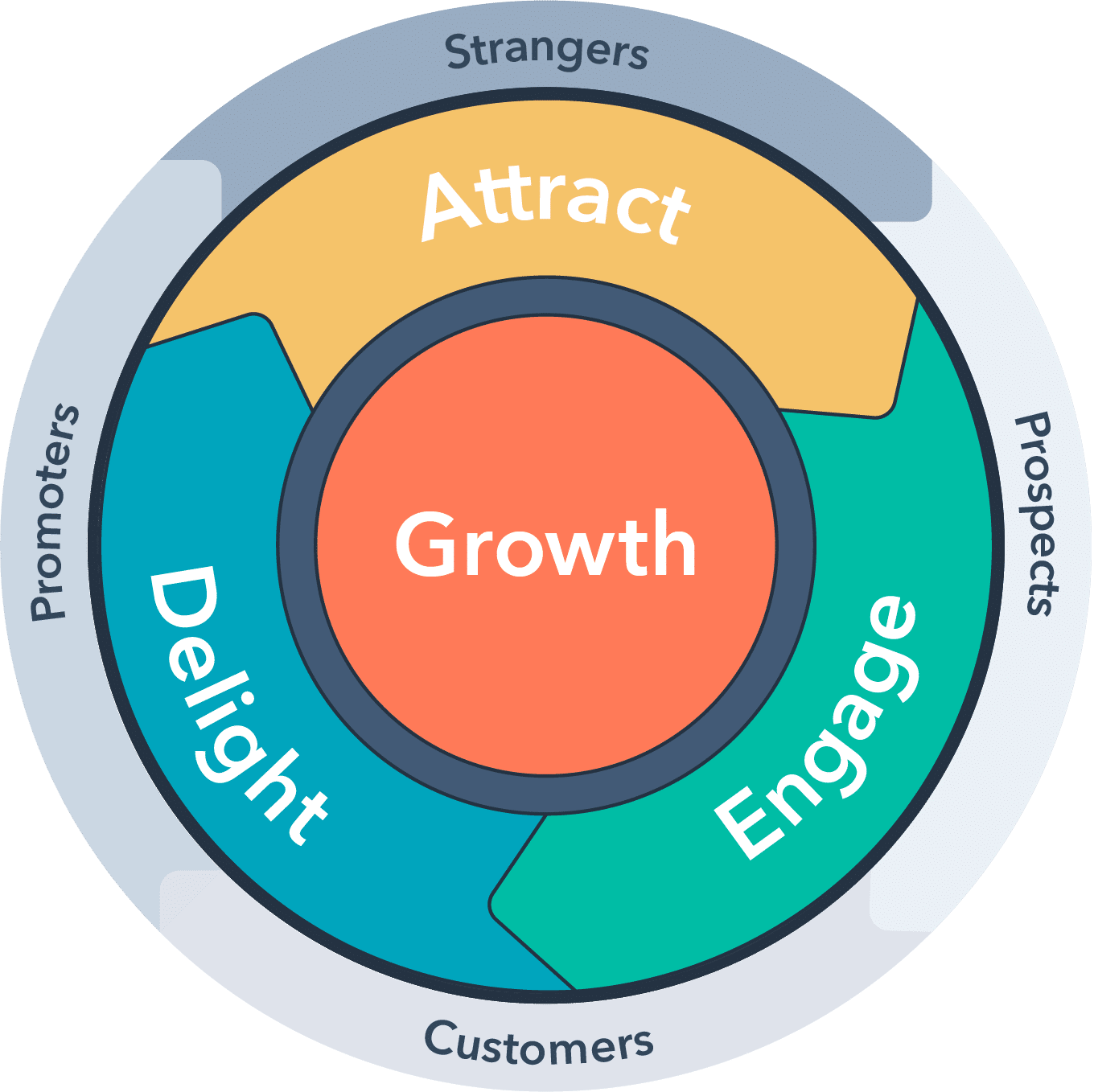
Content marketing is the art of creating and sharing valuable, relevant, and compelling content to attract, engage, and ultimately convert your audience into loyal fans and customers. It’s not about pushing sales pitches or bombarding people with intrusive ads. Oh no, my friends, it’s about building relationships, delivering value, and creating a meaningful connection with your audience that truly grows a company over time.
And I think it’s important to note, within the Inbound Methodology, content marketing will take you far beyond the conversion, or sales stage of the process. Content and specific content marketing tactics and processes can be used extensively within the sales and service functions of your business as well. This ultimately creates a full-circle experience for your customer that not only attracts but also engages and delights them over time.
We’ll talk more about content marketing as it relates to sales and service soon. But let’s first start with marketing – the most common example of where content marketing is embraced.
Imagine you’re sitting at a cozy coffee shop, sipping your favorite brew, and engaging in a really great conversation with a trusted friend. You’re seeking a solution or even just a recommendation for a solution to a problem you’re facing. You’ve connected with your friend that you trust and are hopeful that they’ll provide you with some advice – even if it’s just to point you in a direction.
Content marketing is that conversation brought to life in the digital world with your customers. It’s about sparking conversations that matter, addressing your audience’s needs, and offering solutions to their problems throughout the entire buyer’s journey. That solution might even be to just point them in a direction to take the next step.

At its core, content marketing is about providing a unique and unforgettable experience for your customers. It’s like hosting a dinner party at your home where each dish is meticulously prepared to delight the taste buds and leave a lasting impression on your friends. In the same way, your content should captivate, inspire, and leave your audience craving more as well. You want to make it so easy for them to take your advice that they almost can’t say “no” — at least to just taking the next bite of an appetizer. LOL.
But here’s the catch in my opinion: Content marketing is not just about creating any old content. Using the dinner party metaphor again, mass-produced appetizers from the frozen food section of the grocery store aren’t going to cut it. It’s about creating valuable, high-quality, personalized content that matters and speaks to your ideal customer. It’s about understanding your audience on a deep level, empathizing with their struggles, and crafting content that speaks directly to their hearts and minds. It’s about becoming their trusted advisor, their guiding light in a sea of information overload.
Content marketing is a two-way street. It’s not just about talking at your audience and telling them what they should know; it’s about engaging in meaningful conversations. It’s about inviting feedback, embracing dialogue, and creating a community where your audience feels heard, valued, and understood.

Content marketing is not a quick fix or a one-hit-wonder. It’s a long-term strategy that requires commitment, dedication, and consistency. It’s like nurturing a garden in your backyard, tending to it day after day, and watching it blossom into a vibrant oasis. You need to invest time, effort, and creativity into producing high-quality content that resonates with your audience and keeps them coming back for more.
My company Sanctuary is a good example of this commitment. Sanctuary has been around now for going on two decades. I remember when I first started out, I created my first blog post for the company and we’ve been consistently building on that content year after year ever since.
Our goal has always been to create something valuable that helps our potential and current customers, and something that impacts our organization on so many different levels. The return on the investment has been huge… and that’s a key term too. Content marketing isn’t about spending time, energy, and money to advertise. It’s a critical investment that continues to return value. It not only attracts new customers, it converts prospects to customers, and then it supports and nurtures existing customers over time as well.
It’s a brave new world
Why inbound and content marketing is important for addressing the changing consumer landscape

Going forward, you’ll often hear me reference Hubspot. For those who are not familiar with Hubspot, let me give you a quick overview of why Hubspot is a name that you need to know.
HubSpot is a software company that offers a suite of marketing, sales, and customer service tools designed to help businesses grow and manage their interactions with customers.
HubSpot’s primary offering is its inbound software, which includes a range of features such as content management, lead generation, email marketing, customer relationship management (CRM), social media marketing, analytics, and more. These tools are designed to attract visitors, convert leads, and nurture customer relationships through various stages of the sales funnel.
The company is known for popularizing the concept of the inbound methodology, which focuses on creating valuable content and experiences to attract and engage potential customers, rather than relying solely on traditional outbound marketing methods like cold calling and advertising.
In addition to its software products, HubSpot also offers educational resources, certifications, and a vibrant community of marketers, sales professionals, and business owners. The company has gained significant popularity among small and medium-sized businesses as well as larger enterprises seeking to enhance their inbound marketing and sales strategies.
In today’s fast-paced, digital-centric world, consumers are not just passive recipients of marketing messages and Hubspot is working to solve this problem. Most consumers simply won’t tolerate being marketed to. They are savvy, empowered, and hungry for value. They have data at their fingertips. This is where content marketing can help like a superhero that saves the day!
According to HubSpot, content marketing is a powerful tool that allows businesses to adapt and thrive in this evolving consumer landscape. It’s like having a secret decoder ring that unlocks the hearts and minds of your audience, helping you to deliver the right message to the right people at the right time.
Outbound Marketing vs Inbound Marketing
Gone are the days of interruptive marketing — or outbound marketing — where ads would rudely barge into people’s lives without their consent. Again, most customers don’t tolerate this approach anymore. This still happens a lot, but consumers are now much more in control, and they want to engage with brands on their own terms.
This is why inbound content marketing is a breath of fresh air. It’s about creating content that meets the customer where they’re at. It educates, entertains, and inspires, instead of bombarding people with intrusive ads.
HubSpot emphasizes that content marketing allows businesses to establish thought leadership and build trust with their audience, and this is key. Let me say these words again… trust. Relationships. By providing valuable insights, helpful resources, and engaging experiences, businesses can position themselves as trusted advisors, guiding consumers through their decision-making process, and hopefully starting a long-term relationship.
In fact, when we get into discussing how content marketing can help with servicing your existing customers, the term client success is a critical part of the goal of content marketing beyond just selling to new customers.
Creating strong relationships from the start
Content marketing enables businesses to foster meaningful, long-term relationships with their audience. It’s not just about selling customers on one-off transactions; it’s about building long-term connections based on shared values, beliefs, interests, and aspirations.
Content marketing helps businesses to create a community around their brand, a place where customers become advocates and brand ambassadors. It’s like a club where everyone feels included, valued, and excited to be a part of something bigger than themselves. They truly believe in your business and they’ll be your biggest advocates to others that may have the same problem they had.
Evolve or die in the world of business
Inbound content marketing will help you to evolve to embrace the new realities of growing a business. Again, the consumer landscape is always changing and you need to change with it to survive.
Consumer behaviors, preferences, and expectations are constantly evolving, and businesses must adapt or risk being left behind. But fear not, my friends, because content marketing can be your secret weapon for staying ahead of the curve.
By staying agile and responsive, businesses can use their content marketing strategies to address the changing needs of their audience instead of becoming a dinosaur — literally.
HubSpot suggests that businesses should regularly monitor trends, listen to their customers, tailor their content strategy accordingly, and continuously evolve and improve. This allows businesses to be proactive, anticipate shifts in the consumer landscape, and deliver the content that resonates with their audience on a deep level.
A solid online presence
The foundation of an inbound approach to doing business

Content is considered the foundation of inbound marketing because it forms the core element of the inbound methodology. Inbound marketing is an approach that focuses on attracting, engaging, and delighting customers through relevant and helpful content rather than interruptive and intrusive advertising techniques. Again, this is a critical concept and it starts with creating an amazing website.
Here are the reasons why content is crucial to inbound marketing:
Attracting the right audience:
Creating a website or landing page that’s full of valuable and informative content allows businesses to align their messaging with the needs and interests of their ideal target audience who are visiting. By offering solutions, insights, and relevant information, businesses can attract individuals who are actively seeking answers or solutions to the specific problems they’re facing.
Building trust and credibility:
Well-crafted website content that provides genuine value establishes the business as a trusted source of information and industry expertise. By consistently delivering high-quality content, businesses can build credibility and foster trust with their audience, making it more likely for them to engage further with the brand through their website.
Driving conversions and leads:
Compelling content can encourage website visitors to take desired actions, such as subscribing to a newsletter, downloading an e-book, signing up to attend a webinar, or filling out a contact form to request a meeting or more information. These actions convert visitors into leads, allowing businesses to continue nurturing and engaging with them.
Supporting SEO and organic visibility:
Search engines value high-quality, relevant content, and frequently updated websites. By consistently producing valuable content optimized for relevant keywords, businesses can improve their website’s organic search rankings and increase their online visibility, to potential customers.
Nurturing long-term customer relationships:
Content plays a crucial role in post-purchase engagement and customer retention. By continuing to provide valuable content on your website and through digital marketing tactics like email, social media, and yes, even targeted digital advertising, businesses can nurture their existing customers, offer ongoing support, and foster loyalty that ultimately leads to repeat business and advocacy.
Beyond marketing content
How content marketing can be used for sales and service

When you hear people talking about content marketing, they’re usually talking about digital marketing specifically. The primary job of your marketing team is the awareness stage of the process where their main job is to create new leads that are sent to sales. But within the holistic inbound process, content for your sales team is an unsung hero, ready to nurture leads, build trust, and ignite conversions.
Engaging and nurturing prospects:
Content serves as a tool to engage and educate potential customers throughout their entire buyer’s journey. By providing relevant and valuable content at each stage of the journey, businesses can address their audience’s pain points, answer their questions, and guide them toward a purchasing decision. Content allows you to do this effectively without any ongoing effort from your team.
Imagine a symphony of captivating blog posts, informative case studies, compelling whitepapers, videos, podcasts, and engaging product web-based demonstrations, all harmonizing to educate potential customers, address their pain points, and showcase the remarkable value of products or services.
Each piece of content is carefully crafted to speak to the unique needs and desires of prospects at different stages of their buyer’s journey. From raising awareness to facilitating the final purchase decision, content marketing shines as a guiding light, positioning businesses as trusted advisors and providing the information necessary for prospects to make confident choices.
Content is a powerful ally for the sales team, equipping them with a treasure trove of valuable resources and collateral to sell better. Your sales team will be armed with a comprehensive arsenal of content that’s ready to educate, persuade, and overcome objections. With every interaction, the sales team becomes more than mere sellers; they transform into knowledgeable experts, offering value beyond the transaction and sealing the deal.
Service and Customer Success
Delight your existing customers to retain and generate new revenue

Creating a delightful customer experience using content can be an important weapon on many levels. Through informative self-service resources, helpful guides, and comprehensive FAQs, businesses can empower their customers to find answers and overcome challenges independently. It’s like handing them a treasure map, guiding them toward a treasure trove of knowledge that saves time and effort for everyone involved.
Content marketing takes customer service to the next level by proactively engaging with customers, offering personalized recommendations, and providing amazing ongoing support. Tactics such as email campaigns that deliver tailored content, newsletters brimming with tips and insights, knowledge bases, and answers to frequently asked questions are good examples of content marketing. Even interactive content like quizzes or assessments helps customers navigate their journey with confidence. These are all top-level possibilities to consider.
Exploring a holistic approach to your entire customer journey
By delivering valuable, informative content at every touchpoint, businesses create a bond with their customers. It’s like a symphony of satisfaction, loyalty, and repeat purchases. Happy customers, feeling supported and valued, become brand advocates who sing the business’s praises. This ultimately attracts new customers and creates a vibrant community of loyal enthusiasts.
At Sanctuary, this is our goal as a company. We want to utilize content marketing throughout the entire buyer’s journey for ourselves and our customers. This content is a perfect example of how we’re not only using content for marketing to create awareness, but to educate, increase trust around our brand, and then empower our sales and client success teams with the content they need to do their job better.
Now that we’ve discussed what content marketing is, why it’s important, and how it can be used throughout your entire organization, let’s dive in a little deeper into some other types of content marketing and the specific ways that you can benefit from content marketing.
Brand Awareness – Capture the spotlight
Content marketing plays a vital role in enhancing brand awareness.
In a world saturated with messages and endless distractions, building brand awareness is like stepping onto a vibrant stage and capturing the spotlight. That’s where content marketing swoops in as the star performer, ready to captivate your audience and shine a light on your organization’s unique brand story.
Content marketing is like a melodious symphony, weaving together storytelling, engaging visuals, and valuable information to leave a lasting impression on your target audience. I like this metaphor a lot.
Why is content marketing crucial for brand awareness?
Content marketing is all about forging meaningful connections and making your organization’s voice heard in a crowded marketplace. Through well-crafted content, you can establish a unique brand identity, communicate your values, and showcase your expertise.
Imagine yourself as a master storyteller, weaving narratives that evoke emotions, spark curiosity, and resonate with your audience. That’s the power of content marketing in brand awareness. By creating compelling blog posts, captivating videos, insightful podcasts, or engaging social media content, you can paint a vivid picture of your brand and leave an indelible mark in the hearts and minds of your audience.
Tell your story, but use content to create something larger than yourself
It’s not just about storytelling; it’s about creating a dialogue. HubSpot emphasizes that content marketing allows businesses to engage with their audience, invite conversations, and build a community around their brand. Again, it’s like hosting a get-together at your home where your friends gather and connect. By fostering engagement and interaction, successful content marketing strategy amplifies your brand’s reach and builds a tribe of loyal enthusiasts.
Differentiation – Set yourself apart

We’re all swimming in a sea of competitors, all vying for attention and trying to outshine one another. But fear not, because content marketing is, again, your secret weapon for setting yourself apart from the pack.
First off, content marketing, as we’ve mentioned, lets you define and showcase your brand’s personality like never before. You get to unleash your inner unicorn, sprinkling your content with a touch of magic that’s uniquely yours. Whether it’s through witty writing, quirky visuals, or playful videos, let your personality shine through and magnetize your audience. Be bold, be vibrant, be the flamingo in a flock of pigeons! You have an opportunity to create content that is human, personal, and more unique, on every level, than the competition.
Going beyond pizzazz and personality
Content marketing is your ticket to becoming a trusted voice in your industry. You’re not just creating content for the sake of it; you’re serving up juicy nuggets of value that solve your target audience’s unique problems. You become the go-to source for expert insights, practical tips, and mind-blowing knowledge bombs. By consistently delivering top-notch content, you’ll earn the reputation of being a trusted authority in your field. That’s right, you’re the Yoda or Obi-Wan of your industry, guiding your audience through the treacherous realms of confusion and leading them to the promised land of being a Jedi.
“If everybody is doing it one way, there’s a good chance you can find your niche by going exactly in the opposite direction.” Sam Walton
Let’s talk briefly about niches. Content marketing allows you to carve out your own special corner of the universe. Instead of trying to be everything to everyone, you get to focus on what makes you truly unique. Dive deep into your niche, explore uncharted territories, and conquer them with your unique expertise. By becoming the go-to guru in your specialized area, you differentiate yourself by default.
Tell unique stories
Telling stories about your business is essential because stories have the power to connect, inspire, and leave a lasting impact. Through storytelling, you can humanize your brand, evoke emotions, and create a memorable narrative that resonates with your audience. Stories enable you to convey your organization’s values, purpose, and unique journey, fostering deeper connections and building trust — just like the inbound methodology says.
Content marketing lets you showcase your success stories and happy customers like a proud peacock flaunting its feathers. Share case studies, testimonials, and real-life examples of how your products or services have transformed lives and businesses. By shining a spotlight on these triumphs, you demonstrate your ability to deliver real results and build trust with your audience.
Content marketing allows you to spin tales that captivate and enchant your audience too. Weave narratives that resonate with their hopes, dreams, and desires. Transport them to a world where their problems are solved, their aspirations are realized, and their lives are forever changed. By connecting on an emotional level, you’ll set yourself apart from the crowd.
There are many ways to use content to differentiate
Content marketing can be a powerful tool for differentiating your brand from its competitors. Here are just a few specific ways that content marketing can help you differentiate and rise above the noise:
Addressing specific audience needs:
Content marketing allows businesses to create content that directly addresses the specific needs, challenges, and pain points of their unique target audience. By providing valuable and tailored content, businesses demonstrate an understanding of their audience’s concerns and position themselves as the go-to resource for solving those challenges. This differentiation creates a perception of expertise and relevance.
Unique content formats and delivery channels:
Content of all types provides the opportunity to experiment with different formats and delivery channels that your competitors might be using. By exploring innovative formats, such as interactive content, videos, podcasts, or immersive experiences, businesses can differentiate themselves from competitors who may rely on more traditional approaches. Additionally, selecting unique and effective delivery channels allows businesses to reach their target audience in ways that stand out and capture attention.
Personalized and tailored content experiences:
Content marketing enables businesses to deliver personalized and tailored content experiences based on audience segmentation and preferences. By leveraging data and insights, businesses can create content that speaks directly to the individual needs and interests of their audience, enhancing differentiation and providing a more personalized customer experience.
Building credibility and trust
Craft compelling stories, back them up with solid research, and sprinkle in a touch of your personality.

With content marketing, you’re a business on a mission. You want your audience to see you as the Jedi, right? You’re the trusted confidant and the ultimate problem-solver in your industry.
The first secret ingredient for building trust is value.
Imagine your audience’s eyes lighting up as they devour your blog posts, videos, or social media nuggets, finding answers to their burning questions and gaining valuable insights. By consistently providing valuable and informative content, you’re building a solid foundation of credibility. People start to see you as a reliable resource. You’re the experienced expert in the know, and they’ll keep coming back for more once trust is established.
Nobody trusts Slim Shady – be honest and authentic.
Now, let’s talk briefly about transparency. No one likes a shady character, right? Your audience craves honesty and authenticity. So, be open about your business practices, share behind-the-scenes stories, and let your audience peek into the inner workings of your organization. By being transparent, you build trust and forge a genuine connection with your audience. They’ll appreciate your honesty and reward you with their trust.
In the world of content marketing, building credibility and trust is a great goal. By providing value, showcasing your expertise, being consistent, embracing transparency, and adding a pinch of personality, you’ll begin to create a really strong and lasting bond with your audience. Yes, we call this a relationship, and that’s our goal.
Respect my authority.
It’s not just about sharing knowledge; it’s about having the credibility and influence to back it up. That’s where content marketing works its magic. By producing high-quality, authoritative content, you build a reputation for being an expert in your field. You demonstrate your deep understanding, your experience, and your ability to deliver results. You are essentially putting on a crown of authority and claiming your rightful place on the throne.
HubSpot emphasizes that thought leadership and authority are not achieved overnight. It’s a journey, a process of building trust, establishing credibility, and consistently delivering value. Content marketing allows you to nurture that journey, one piece of content at a time. It’s like planting seeds and watching them grow into mighty oaks of influence over time.
Education
Helping your target audience to learn and understand the options they have to solve their problems

Consumers these days are not just looking for products or services. They crave knowledge, insights, and guidance to navigate the complexities of their world. That’s where content marketing takes center stage, like a wise teacher ready to impart wisdom and empower your audience.
Content marketing is fundamentally a powerful tool for education, allowing businesses to connect with their audience on a deep, intellectual level. (Yes, I hope you are actually learning something by reading this today.) I’m trying, humbly, to step into the role of a trusted mentor, guiding you through a journey of discovery.
Educational content can be the key that unlocks the doors of knowledge that empowers your target audience to take action and make a decision. It’s through well-crafted content that you can educate, inform, and enlighten your audience and achieve their goals, as well as your goals. By providing valuable insights, practical tips, and educational resources, you can lead them down the path that you want and that they need to take to solve their problems, and ultimately toward a sale.
It’s not just about disseminating information.
Content marketing allows businesses to connect with their audience on a deeper level by understanding their pain points, challenges, and aspirations. It’s a personalized curriculum that addresses the specific needs of your audience and provides them with the tools they need to succeed.
As you provide valuable educational content, you attract an audience that values knowledge and craves continuous learning. You foster engagement, spark conversations, and create a community of curious minds.
HubSpot emphasizes that educational content marketing is not about one-way communication; it’s about fostering a dialogue. It’s about encouraging your audience to ask questions, share their insights, and participate in the learning process.
Share your wisdom, insights, and practical advice. In theory, you can become the trusted mentor who empowers your audience to find solutions and meet their goals. With content marketing as your guiding light, you’ll build a community of lifelong learners who turn to you for knowledge and inspiration, all throughout their buyer’s journey.
SEO – Search Engine Optimization and Content
They go together like peas and carrots – Forrest Gump

In the vast digital landscape, where search engines currently reign supreme, businesses need a strategy that allows them to stand out and attract organic traffic. Have you heard of Google? (Laughs out loud) This is where content marketing swoops in like a superhero again, armed with the power to create awareness, connect with, and captivate your target audience.
Content marketing and SEO combined provide a pivotal role in enhancing your website’s visibility and driving organic traffic. It’s a magical potion that combines the art of storytelling with science.
High-quality, relevant content is the fuel that powers your SEO efforts. There are other technical “SEO” best practices that you’ll have on your to-do list. But, it’s through well-crafted, high-quality, unique, valuable content that you can optimize your website, attract search engine (and customer) attention, and begin to create visibility and leads for your business.
Here we go again… have you heard of Obi-Wan Kenobi? It’s like waiving your hand to sprinkle specific keywords, insights, and valuable information throughout your website that connects within the mind of a search engine like Google. That’s the power of content marketing and SEO in a nutshell. By producing content that aligns with the intent of your target audience and incorporates relevant keywords, you improve your website’s visibility and increase your chances of attracting organic traffic tenfold.
Keywords
Here’s a quick note about keywords. Content marketing and SEO go beyond mere keyword optimization. Content marketing is not just about appeasing search engines with the number of keywords in your content; it’s about creating valuable, informative content that resonates with your audience above all. The focus should always be on creating quality content that speaks to your target audience first, but also works to attract organic traffic to your website from search engines.
Your content needs to have the right keywords and phrases within it. This is true. I don’t want to discount the importance of keywords because having the right keywords in your content will make or break your efforts. But the takeaway is that they should be secondary to creating great content that’s valuable for the end user for all the reasons we’ve listed so far.
Lead Generation and Conversions:
Awareness and traffic to your website are important, but leads and conversions are king!

So to this point, we’ve talked a lot about creating content and why content marketing, in general, is important. But all the content in the world isn’t worth anything if it doesn’t help you to generate more leads that convert to sales.
Leads are the lifeblood of your business. Leads represent potential customers who have expressed interest in your products or services. These individuals hold the power to fuel your revenue streams, expand your customer base, and drive sustainable growth.
But leads alone are not enough. You need conversions, those magical moments when a lead transforms into a paying customer. Conversions are the ultimate goal, the crown jewel of all your team’s work. Conversions signify that your content marketing efforts, your value proposition, and your brand message have successfully resonated with your audience, compelling them to take that decisive step toward becoming loyal customers.
Harmonizing a beautiful transformation – Content can guide your leads on the path to becoming loyal customers.
First and foremost, content marketing plays a pivotal role in nurturing the leads that come in cold to your website. By delivering valuable and relevant content tailored to each stage of the buyer’s journey, you can engage, educate, and build trust through informative blog posts, compelling case studies, captivating videos, and personalized email campaigns. This is all content that will provide the insights and information that customers need to make informed purchase decisions and ultimately convert to customers.
Again, Inbound content marketing is not about pushing sales pitches either to close the deal. Content marketing is about slowly building relationships and positioning your brand as a trusted advisor over time. This creates a positive association with your brand and increases the likelihood that leads will turn to you when they’re ready to make a purchase.
Furthermore, content marketing allows you to address common objections and concerns that might be holding leads back from taking the leap into converting into customers. By creating content that specifically tackles these pain points and showcases the unique benefits of your product or service, you can alleviate doubts and provide reassurance. This empowers leads to move forward in the sales process and overcome any hesitations they may have.
The marriage of marketing, sales and service
Attract, engage and delight

As I’ve mentioned, the magic of content doesn’t stop with the marketing department. It also equips your sales and services team with valuable resources and collateral to increase new revenue. By providing your marketing, sales and service teams with relevant content, such as case studies, product guides, or comparison articles, you enable them to deliver personalized and persuasive messages that resonate with potential and current customers. This content acts as a powerful tool within your team’s arsenal, helping them to address objections, highlight key features, and ultimately increase revenue with finesse.
Lead scoring and continuous improvement
Not all leads are created equal. Content marketing requires lead scoring and segmentation. By tracking how leads engage with your content, you can identify their level of interest, intent, and readiness to make a purchase. This valuable data allows you to prioritize leads, tailor your sales approach, and focus your efforts on those most likely to convert.
Content (Marketing) is KING!

If I haven’t given you enough reasons to consider implementing your own ongoing content marketing strategy, let’s close things out today and work to put the icing on the cake!
Adaptability and versatility
Content marketing is a remarkable discipline that possesses an inherent adaptability, allowing it to seamlessly utilize various formats and platforms. This adaptability is a testament to its versatility, enabling marketers to tailor their messages and storytelling techniques to captivate audiences across diverse mediums and channels.
One of the primary reasons content marketing is highly adaptable lies in its ability to transcend the limitations of traditional advertising. Unlike traditional ads that often interrupt and impose upon audiences, content marketing operates on a different wavelength. It embraces a softer, more nuanced, more human approach that provides value and builds relationships rather than overtly promoting products or services. This mindset shift is fundamental to its adaptability, as it allows content marketers to craft content that aligns with the preferences and expectations of their target audience.
Another facet of content marketing’s adaptability lies in its malleability across different formats. Content can be repurposed and take myriad forms, ranging from blog posts, articles, and white papers to videos, podcasts, and infographics. Each format possesses its own unique attributes, catering to diverse audience preferences and consumption habits.
Related to the various forms of content, let’s move on to discuss further…
Supporting other marketing efforts
Content marketing is not an isolated entity but rather an essential component that supports and enhances various other marketing efforts and tactics in many different ways. Like a supportive backbone, it strengthens the overall marketing strategy, ensuring cohesiveness and effectiveness across different channels and initiatives. Content marketing plays a pivotal role in driving success and amplifying the impact of other marketing endeavors. This idea of repurposing is powerful.
For example, our company has a regular newsletter for marketers and business owners that’s geared toward helping them keep up with the things they need to grow their businesses. Sending the newsletter is considered to be an email marketing tactic. But, the newsletter in isolation would be useless without great content in the form of news, advice, videos, podcasts, etc.
The same holds true for social media. We do create unique visual content for our social media, but our other content marketing assets are distributed and consumed on social media in addition to our website and even offsite on places like YouTube. This is repurposing in its simplest form. This content resonates with the audience and it encourages social sharing, amplifying the reach and visibility of the brand as well.
Cost-Effective Investment, not an advertising spend
Traditional advertising, with its interruptive nature and one-way communication, is losing its effectiveness. The costs to compete online can be significant with digital advertising, and when you stop spending, you’re gone off the radar. While the initial investment in creating high-quality content can be high as well, the long-term returns far outweigh the costs.
Unlike traditional advertising, which has a limited shelf life, inbound content has the potential to deliver value over an extended period. Content, once created, can continue to attract and engage and delight customers indefinitely. An informative blog post, for example, can drive organic search traffic and generate leads long after it is published — years, or even decades in fact. This “evergreen” nature of content ensures that the initial investment in its creation continues to yield results, making it a highly cost-effective strategy in the long run.
Inbound content marketing leverages the power of search engines and social media platforms to amplify its reach and drive traffic. By optimizing content for search engine optimization (SEO) and social media, companies can tap into free, organic traffic and reach a broader audience without the need for expensive advertising campaigns. Through effective keyword targeting and strategic distribution, inbound content marketing maximizes visibility and increases the chances of attracting qualified leads.
One last cost-saving aspect of inbound content marketing is its ability to nurture leads through the buyer’s journey. Unlike traditional advertising, which often aims to just generate leads, inbound content marketing recognizes that consumers may require time and information to make purchasing decisions. Even when they become customers, there is still a lot of potential to increase repeat sales, upsells, and cross-sales. By delivering valuable content at each stage of the buyer’s journey, companies can build trust, establish their expertise, and guide prospects toward spending more over time.
So get out there and create some amazing content!
In conclusion, inbound content marketing offers a multitude of benefits for businesses striving to succeed in today’s competitive marketing landscape. By focusing on creating valuable and relevant content, companies can establish themselves as trusted authorities, build meaningful relationships with their audience, and ultimately drive business growth.
“Inbound content marketing is not just a cost-effective way to attract and engage customers—it’s a strategic investment that builds trust, establishes thought leadership, and drives sustainable business growth” (Source: HubSpot).
This quote beautifully encapsulates the essence of inbound content marketing as a transformative approach that goes beyond immediate sales and focuses on building lasting relationships with customers. This is ultimately what creates the new revenue that’ll grow a business.
Inbound content marketing is a powerful and cost-effective strategy that enables businesses to attract, engage, and delight their target audience throughout the entire buyer’s journey. By creating valuable content, industry leaders can drive meaningful growth for their organizations, and thrive in the dynamic world of modern marketing and business.
Most Popular Articles

Seeing Favicons in Your Google Search Results? Here’s Why…
Have you noticed anything different in your Google Search results lately? Google added tiny favicon icons to its organic search results in January. It was…

Business Growth and Digital Marketing News & Tips 4-14-24
Did you know? It’s five to twenty-five times more expensive to acquire a new customer than to retain an existing one. Increasing customer retention by…

Business Growth and Digital Marketing News & Tips 3-28-24
With the desire for precise measurement tools to determine ROI, there has been a rise in attention metrics. These metrics, which often utilize eye-tracking data,…








